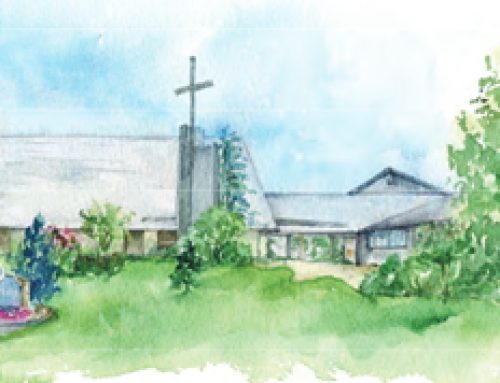Solemnity of Mary, the Holy Mother of God
FROM THE PASTOR’S DESK
My Dear Parishioners,
It might come as a surprise to you that in this short and tranquil gospel, which is proclaimed on New Year’s Day, Mary shows us how to deal with tragedy in our lives. The relevant passage is only one sentence, but it is a sentence in which every word counts. It reads, “And Mary treasured all of these things, reflecting upon them in her heart.”
Now what are the things that Mary treasured? They are the events that surround the birth of Christ. But what is peculiar about this line is it says that Mary treasured all these things. This is perplexing. If the line said that Mary treasured some of these things, it would be easy to understand. Some of the things surrounding the birth of Christ were wonderful indeed. It would make sense to treasure the angels’ song, the visit of the shepherds, the healthy baby boy that Mary brought into this world.
But the text does not say that Mary treasured some of these things, but that she treasured all of these things. This is confusing because some of the things surrounding the birth of Christ were quite horrible. Remember that Joseph was ready to divorce Mary when he discovered that she was pregnant. In time the two of them moved beyond that hurtful judgment, but it certainly left scars on the relationship. Exactly what part of that near disaster do we imagine Mary was treasuring? We cannot forget the forced and difficult journey to Bethlehem in the last few days of a pregnancy and the profound disappointment that Mary must have felt as she had to place her beautiful baby boy in a filthy manger. What was there about these hardships that Mary was holding close to her heart? Nor was it good news that wicked King Herod was trying to kill the child. His plans would eventually force the Holy Family to flee to Egypt. Was this something Mary would want to remember?
What part of this evil and violence was Mary treasuring? It is helpful to know that the Greek word here that we translate as “treasure” actually means “to hold onto” or, by extension, “to accept.” If we understand the word in this way, the text is telling us that Mary is accepting all of these tragic aspects of Jesus’ birth. Why is she accepting them? Because she understands that not to accept them would leave her life dominated by anger, denial, and depression. Mary did not choose to live that way. She did not choose to live in anger with Joseph over his failure to trust her, with depression over the impoverished and pathetic circumstances in which she needed to give birth, or denial that King Herod was truly trying to kill her son.
Mary accepted all of these tragic aspects of Jesus’ birth. She held them. She treasured them, because they were the way the birth came about. By her example, she tells us that when we need to deal with tragic aspects of our life, we must accept them as well. “Yes, I have cancer.” “Yes, I am divorced.” “Yes, I have been hurt deeply by someone I trusted.” Such acts of acceptance do not mean that the tragic aspects of our lives are somehow good and beautiful. Our tragedies remain tragedies. But they must be claimed as our tragedies, because it is only by accepting them that we can move forward and continue to live.
But Mary does more than show us the importance of accepting our tragedies. The second part of the text reads: “reflecting upon them in her heart.” Again, the Greek is helpful. The word here translated as “reflecting” is a wonderful Greek word which literally means “to throw together.” So, the scripture is telling us that Mary first accepts the tragedies she has experienced and then “throws them together” with the rest of her life.
n “throws them together” with the rest of her life. Mary shows us then a pattern of “accepting” and “throwing together.” And what is important in this pattern is when our tragedies are thrown together with the rest of our lives, it allows the good things to win. “Yes, I am divorced, but I have friends who have stood by me throughout the entire process.” “Yes, I have been deeply hurt, but I have never been more creative in my job.” “Yes, I do have cancer, but now I see more clearly the beauty of life and am so much freer to express my love to others.”
Bad things happen to us all. When they do, the only way we can move forward, the only way that we can continue to live, is to accept those tragic things as a part of our story. And once we accept them, we can throw them together with all the good things that are still ours. This is how Mary dealt with the birth of Jesus. This is how we can, with God’s grace, deal with the tragedies of our lives so that we can continue as healthy and joyful people.
Peace,
Fr. Monteleone
To read the complete bulletin click here



